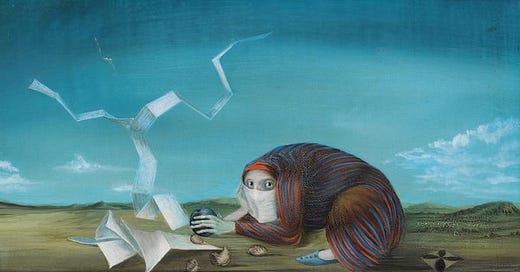The Only Writing Advice I'd Ever Give
A Lesson from Sleeping Beauty, Oedipus Rex, & Marc Andreessen
A wicked fairy curses a princess at her christening so that she will die at the age of sixteen by pricking her finger on the spindle of a spinning wheel. As a precaution, the king orders all spinning wheels throughout the kingdom to be burned while the princess is raised in a forest cottage so that she can live in safety until her sixteenth birthday. Yet, fate doesn’t stutter: The terrible prophecy fulfills itself and Princess Aurora falls into a deep, never-ending sleep.
That’s the story of Sleeping Beauty. Although it is most known for its romance, I think we ought to spend more time examining its theme of inescapable doom. The Greeks call this “hamartia”, or, tragic flaw. The essence of tragedy is that it is a person’s own character that leads them to their demise. Had Princess Aurora been less curious, she wouldn’t have crept into a lonely castle. Had Romeo and Juliet asserted more reason over their impatient teenage passion, they wouldn’t have rushed to their deaths.
The epitome of tragedy, Oedipus Rex, says:
“Creon [the antagonist] is not your downfall, no, you are your own.”
The myth of Sleeping Beauty is embedded in every venture. Every founder, creator, or anyone who dares to try, has an inner Princess Aurora. There’s a miniature Oedipal journey nested inside every act of human creation:
No matter how hard you try to conceal your fatal flaw, it will end up being the exact reason behind your failure.
A chain will always break at its weakest link, and there will always be a weakest link. No matter how tall the walls are, there will always be a snake—one that God can’t even save you from—hiding in your paradise. Fate is called fate precisely because it is unavoidable.
And because everyone has their own tragic flaw, no amount of advice will save you from your personal made-to-measure doom. You and I may have common strengths, but your greatest weakness is surely bespoke. No matter how much guidance you receive, how many spinning wheels you burn out of precaution, you will always find a way to prick your finger.

No matter where you go, there you are.
The meaning of “flaw” in hamartia is linked to the concept of fate because it describes how it is the elements of one’s own psyche that writes their story.
Hamartia, on the surface, may seem like the will of the gods, but dig deeper and you’ll find that it is your own habits—formed by luck, genetics, or conditioning—that determine your ways. Some parts are not within personal control: DNA, country of birth, parents, number of ancestors involved in slavery, and so on. Some parts are almost completely within personal control: what time to get up at, how much sugar to eat, which color shoes to wear, and more. Some destinies are formed as a hybrid between these two, such as depression and/or generational wealth.
There’s a myriad of causes for both success and doom; the tough news is, bits of the latter are sometimes inevitable. It’s almost as if the price of being a hero is paid for by carrying your own kryptonite—if you dare to venture, you will be taxed with a painful level of self-consciousness or an existential awakening that is rude beyond expectations.
In a podcast, Lex Fridman asked
to share advice on starting a company, to which he replied, “The best reason to start a company is because you cannot tolerate not starting it.” With consideration of risk, most startup founders will be more successful if they choose a “normal” job at a big company. So, the only reason one should start a company is if one cannot not start a company. If you have to question whether or not it’s the right move, then the answer is definitely no.Ask yourself this: if someone came from the future to tell you that the passion project you’re working on right now is destined to fail in a certain number of years, would you still continue building it? If fate said that Pluripotent is destined to fail in 2033, I’d still write tomorrow because, for me, writing is an end in itself. I can’t not write, and so even if I fail, I fail on my own account.
Not every venture will fail, but every venture has an absolute chance of failing absolutely. The real question is whether or not that is what’s going to discourage you.
Writing is guaranteed to be blemished with criticism and misunderstanding. Expect to be wrong and humbled. The idea of doom scares all of us, but is that enough to stop you? If we can’t be immune to the attack of the unknown unknowns, if we can’t prevent unpreventable mistakes, then the best we can do is stomach it…otherwise, don’t try at all.
If your curiosity outweighs your discomfort around risk, write. If the worth of broadcasting your ideas to the world is heavier than the burden of doubt, write. Otherwise, you’re better off doing other things.
~
Thank you for reading (and please share!),
Sherry
“Find what you love and let it kill you.” — Charles Bukowski, probably





This is the best thing I've read in a long time...
Really great sentiment!